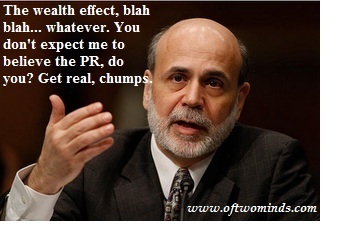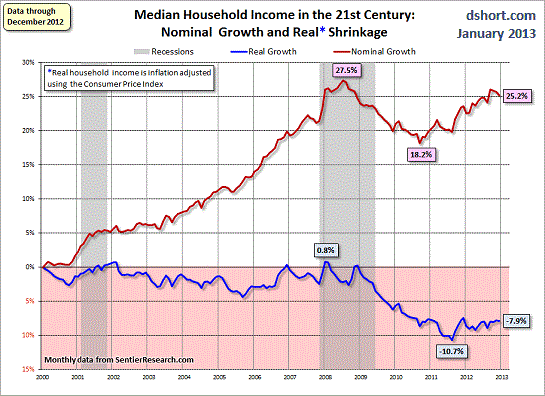“April 15, 2013
If feedback from the real world is suppressed, then decisions will necessarily be bad.
You’ve probably heard this stock market truism: what everyone knows has no value. This has several components:
1. If you’re basing your trading decisions on the same contexts and conclusions as everyone else, it’s difficult to develop much of an edge.
2. Unless it’s completely manipulated, the market generally doesn’t reward “what everyone knows,” i.e. the consensus, for long.
3. “What everyone knows” often includes trends and targets. For example, everyone now knows gold is in a bear market and the next technical target is $1,250 – $1,300. As a result, everyone’s on one side of the boat: those recommending buying gold at $1,480 are few and far between.
Legendary traders like Jesse Livermore viewed the market as a mechanism for taking as much money from the consensus as possible: taking as few traders as possible along on bullish runs higher and punishing as many traders as possible on bearish declines.
This raises two questions:
1. What does everyone not know that might have value?
2. Is there some contrarian value in what everyone knows?
We all know the Federal Reserve is manipulating the stock market. It does so in two ways:
1. Financial repression: lowering the yield on “safe” assets such as Treasury bonds to negative rates (adjusted for inflation, you’re paying the government to park your capital in its bonds), which drives capital into so-called risk assets that offer a yield, for example dividend-paying stocks and rental housing.
2. POMO and bulk purchases of futures contracts on the S&P 500 before the market opens. Studies have found that the majority of gains in the stock market occur on POMO (one of the Fed’s quantitative easing programs) days and on days when large lots of E-Mini futures contracts are purchased, pushing the markets higher at the open.
Everyone knows markets in the U.S. and Japan are levitating higher as money is created and pushed (via currency devaluation and financial repression) into stocks.
What nobody knows is the eventual consequence of all this manipulation. Right now the consensus is “don’t fight the Fed,” meaning stay invested in stocks because they’re going higher.
In less-manipulated markets, we would expect the consensus to eventually be punished, simply because the market rarely rewards the majority for long. But in central-planning manipulated markets, the feedback that is the foundation of open markets has been suppressed.
Feedback is another way of saying information from the real world is allowed to enter a transparent exchange. We know the exchange is no longer transparent, what with dark pools and high-frequency trading machines. We also know signals from the real economy are not the dominant market-moving forces.
What we know, but cannot say out loud lest the charade lose power, is that the Fed is manipulating the stock market higher because it has lost the ability to manipulate the real economy. Our political and financial Elites would prefer to extend their neofeudal dominance by expanding the traditional foundations of debt-based “prosperity”: increasing household income so households can spend more and service more debt.
With household incomes for the bottom 90% in structural decline, they’ve failed, for reasons they either can’t understand or dare not discuss.

Their only control is the lever pushing stocks higher. Publicly, Fed chairman Bernanke has justified goosing the stock market and housing higher as the only available way to trigger the wealth effect, an inner state of consumerist bliss in which the owner of assets sees his assets gain in value. Feeling wealthier, he goes out and buys a bunch of junk he doesn’t need with debt, boosting demand and bank profits.
As for the fact his real income is declining–sorry, Bucko, we can only boost your assets and herd you into risky bets and more debt. The 90% of you with no meaningful exposure to the stock market–well, don’t you feel things are picking up when you see those “Dow hits new high” headlines? Of course you do; that’s the propaganda value of goosing markets higher.

When the causal connection between risk and consequence has been severed, we call it moral hazard. When banks get to keep their gambling profits and taxpayers cover the banks’ losses, this is moral hazard writ large.
In effect, the Fed is extending moral hazard to the entire stock and housing markets. What the Fed is implicitly promising is this: “Go ahead and sink your wealth and income into risky stocks and housing, because we have your back–we’ll never let stocks or housing go down again.”
Do we know if this campaign of extending moral hazard into every market is sustainable over the long term? No. It is an unprecedented experiment, just like the Krugman Cargo Cult Fantasy being played out by the authorities in Japan……”
If you enjoy the content at iBankCoin, please follow us on Twitter

